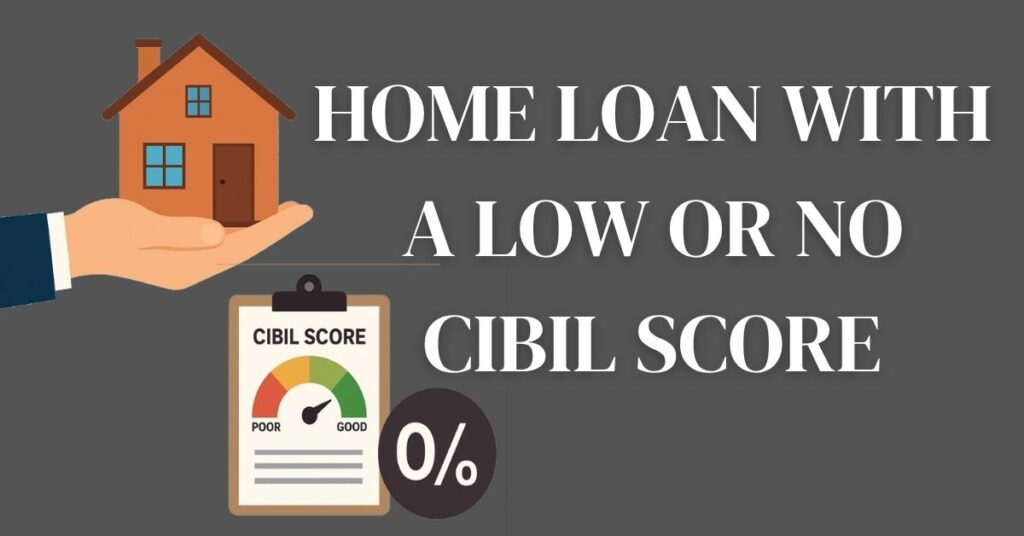

How to Get a Home Loan with a Low or No CIBIL Score
Buying a home is frequently considered one of the most significant financial milestones in life. It’s not just about having a roof over your head; it’s about fiscal stability, long-term wealth creation, and emotional security. However, for numerous Indians, the dream of retaining a home can be complicated by one factor: your credit history.
A strong credit score opens doors to lower interest rates, quicker loan approval, and larger loan quantities. On the other hand, a low CIBIL score or no credit history can make banks reluctant, detention blessing, or indeed lead to outright rejection. This situation is common among youthful professionals, first-time borrowers, and individuals who have avoided credit in the past.
Fortunately the good news: having a low or no CIBIL score doesn’t mean you can not get a home loan. With the right strategies, attestation, and lender choices, you can still secure backing for your dream property.
To help you navigate this challenge, In this comprehensive companion, we’ll cover
- What CIBIL score is and why it matters.
- The challenges of low or no CIBIL scores.
- Detailed strategies to ameliorate your blessing chances.
- Lender options and indispensable backing paths.
- Common miscalculations to avoid.
- How platforms like MoneyBuddha help simplify the process.
By the end, you’ll have a complete roadmap to navigate home loan operations, indeed, if your credit history isn’t ideal.
Understanding CIBIL Score and Its Significance
To begin with CIBIL( Credit Information Bureau India Limited) is India’s primary credit standing agency. It maintains credit histories for millions of borrowers and generates a three-number credit score ranging from 300 to 900. This score represents your creditworthiness, which lenders use to assess the liability of repayment.
Specifically A breakdown of scores
- 750( Excellent) High blessing chances, smallest interest rates.
- 700 – 749( Good) blessings, probably, interest rates slightly advanced.
- 650 – 699( show) Banks may be reluctant; interest rates advanced, stricter scrutiny.
- 600 & below( Poor) veritably low blessing chances; may bearco-applicant or collateral.
- No Score( NA/ NH) Common for first-time borrowers with no previous loans or credit cards.
In particular, Lenders use CIBIL to estimate
- Payment History: Have you repaid loans on time?
- Outstanding Debt: How important is debt?
- Credit Mix: Do you have experience handling different types of credit( credit cards, particular loans, etc.)?
- Punctuality: Any detainments or defaults in once-disbursed disbursements?
As a result, A strong CIBIL score signals that you’re a responsible borrower, which frequently leads to faster blessings and better rates. On the other hand, a low score triggers caution from banks, meaning they may.
- Increase interest rates.
- Bear advanced down payments.
- Ask for co-applicants or fresh collateral.
Challenges of Getting a Home Loan with Low or No CIBIL
- Nevertheless, While it’s not impossible to get a loan with a low or absent score, there are real challenges.
- Lower-blessing Probability Banks prioritise low-threat borrowers. However, your operation may be rejected by mainstream banks if your score is below 650.
- Advanced Interest Rates Lenders charge a threat decoration for low-credit borrowers, which increases EMIs and total interest outgo.
- Lower Loan Amounts Banks may authorise only 60 – 70% of the property value rather than the typical 80 – 85%.
- Fresh Conditions: Some lenders require collateral or advanced down payments.
- Limited Lender Options: Not every bank or casing finance company entertains low-score aspirants.
Despite these challenges, there are proven ways to ameliorate your chances of blessing, which we’ll explore in detail.
Strategies to Get a Home Loan with Low or No CIBIL
Now, let’s look at strategies, Target NBFCs Over Traditional Banks
Non-Banking Financial Companies( NBFCs) frequently borrow flexible evaluation criteria. Unlike large banks that depend heavily on CIBIL, NBFCs also consider
- Stability of income
- Being prepayment capacity
- Quality of the property
- Relationship with the aspirant
However, While the interest rates may be slightly higher ( 0.5 – 1%), NBFCs are frequently more willing to authorise loans for borrowers with weak or no credit histories.
Example: A borrower with a CIBIL score of 640 may be rejected by a public-sector bank but approved by an NBFC with slightly advanced rates but flexible terms.
Apply with a Co-Applicant or Guarantor
An applicant with a strong credit history can significantly improve blessing chances. Banks estimate the concerted income, credit history, and prepayment capacity.
Scenario:
- Rahul’s CIBIL score is 620
- woman’s CIBIL score 780
- With a common operation loan approved for ₹ 50 lakh at a competitive interest rate
This approach spreads the lender’s threat and makes your operation stronger.
Make a Larger Down Payment
If you are able to pay 30 to 40 per cent of the property upfront, lenders are more likely to approve the remaining amount with a low CIBIL. By lowering the loan-to-value (LTV) rate, an advanced down payment lessens the bank’s risk.
For instance, paying ₹ 15 to 20 lakh upfront for a home worth ₹50 lakh shows financial restraint and reassures lenders.
Show evidence of Strong Income
Lenders want to ensure you can repay the loan despite any credit issues. give clear evidence of
- Consistent salary for at least 6–12 months
- ITR statements for 2–3 years (for self-employed)
- Bank statements showing steady deposits
A strong, empirical income compensates for a poor credit history, signalling that you can meet your obligations reliably.
Use Secured Loans or Collateral
Pledging, similar to fixed deposits, gold, or other property, can help secure blessings. Collateral reduces the lender’s threat, increasing your chances indeed with a low CIBIL score.
Approach Cooperative Banks or Regional Lenders
Some indigenous banks estimate borrowers tête-à-tête rather than counting solely on credit scores. However, they may authorise your loan based on trust and fiscal stability if you have a long-standing relationship or regular account with these banks.
Government-Backed Schemes
Sometimes, first-time homebuyers without a solid credit history can get home loans through programs like the Pradhan Mantri Awas Yojana (PMAY). These programs frequently come with
- Lower interest rates
- subsidies on loan amounts
- Special consideration for weaker-credit aspirants
Make Your Credit Before Applying
Still, erecting a small but solid credit history before applying for a home loan can be a game-changer if you have no CIBIL score. Indeed, just 6 – 12 months of responsible credit use can demonstrate to lenders that you’re a secure borrower. This doesn’t bear taking large loans; small things like paying off a particular loan or using a credit card responsibly work wonders.
Ensure you pay all bills on time, maintain a low credit application rate( below 30), and avoid multiple loan operations. This gradational approach helps you establish a positive fiscal track record, making lenders more willing to consider your home loan operation, even if you have no previous credit history.
Maintain translucency with Lenders
Honesty goes a long way. Declare any once fiscal issues and give supporting attestation. Banks frequently appreciate visionary exposure and may be more flexible.
Keep Documentation Ready
Lenders dealing with low or no-CIBIL-score borrowers check operations more closely. Keeping your payment slips, bank statements, ITRs, and property documents organised and ready not only speeds up the process but also increases your chances of blessing. A well-set borrower signals soberness and trustworthiness, which can occasionally outweigh a weak credit score in the lender’s evaluation.
Money Buddha Simplifying Your Loan Search
That’s where smart tools come in — Finding the right lender is half the battle. Platforms like MoneyBuddha allow you to:
- Compare lenders who cater to low/ no CIBIL borrowers
- estimate interest rates, term options, and processing fees
- Use calculators to understand the EMI impacts of advanced interest rates
- Read reviews of lenders from factual borrowers
- Avoid repeated rejections that could further hurt your score
In short, Rather than applying aimlessly, MoneyBuddha helps you make data-driven decisions for advanced blessing opportunities.
Common Miscalculations to Avoid
- First, Applying to multiple banks at the same time. Each hard inquiry reduces your score.
- Second, Overlooking retired freight, check processing charges, late freight, and repayment penalties.
- Third, Borrowing beyond capacity blessing doesn’t mean affordability; calculate EMIs precisely.
- Additionally, Neglecting credit enhancement. Indeed, after blessing, work on building a good CIBIL score for future loans.
- Finally, Ignoring attestation conditions,- score borrowers face redundant scrutiny; missing documents can lead to detainments.
Case Studies
For instance Case Study 1: Low Score, Large Down Payment
Ramesh( CIBIL 620) wanted a ₹ 40 lakh home loan. Banks rejected him originally. By arranging a ₹ 15 lakh down payment and applying via an NBFC, he got approved at 9.5% interest.
Similarly Case Study 2: No Credit History
Ananya had never used a credit card or a loan before. CIBIL NA. By approaching MoneyBuddha’s recommended NBFCs, she secured a ₹ 25 lakh loan at 8.9% after furnishing stable job and income attestation.
Finally Case Study 3Co-Applicant Strategy
Vikas’s score is 640. Loan rejected collectively. With his family( score 780) as an asco-applicant, the bank approved ₹ 50 lakh at 8.4.
Conclusion
In conclusion, It can be difficult, but with the correct strategy, it is completely possible to obtain a home loan with a low or no CIBIL score. Techniques such as
- Choosing NBFCs over banks
- Adding an ACO applicant or patron
- Making advanced down payments
- Demonstrating strong income
- Using collateral and government-backed schemes
- structure credit history gradationally
- Keeping attestation ready
It can dramatically ameliorate your chances.
Moreover Also, platforms like MoneyBuddha streamline the process, helping you find lenders willing to work with low-score aspirants while avoiding gratuitous rejections.
Ultimately, With planning, tolerance, and strategic operation, you can secure your dream home indeed if your credit score isn’t perfect.









Leave a Reply